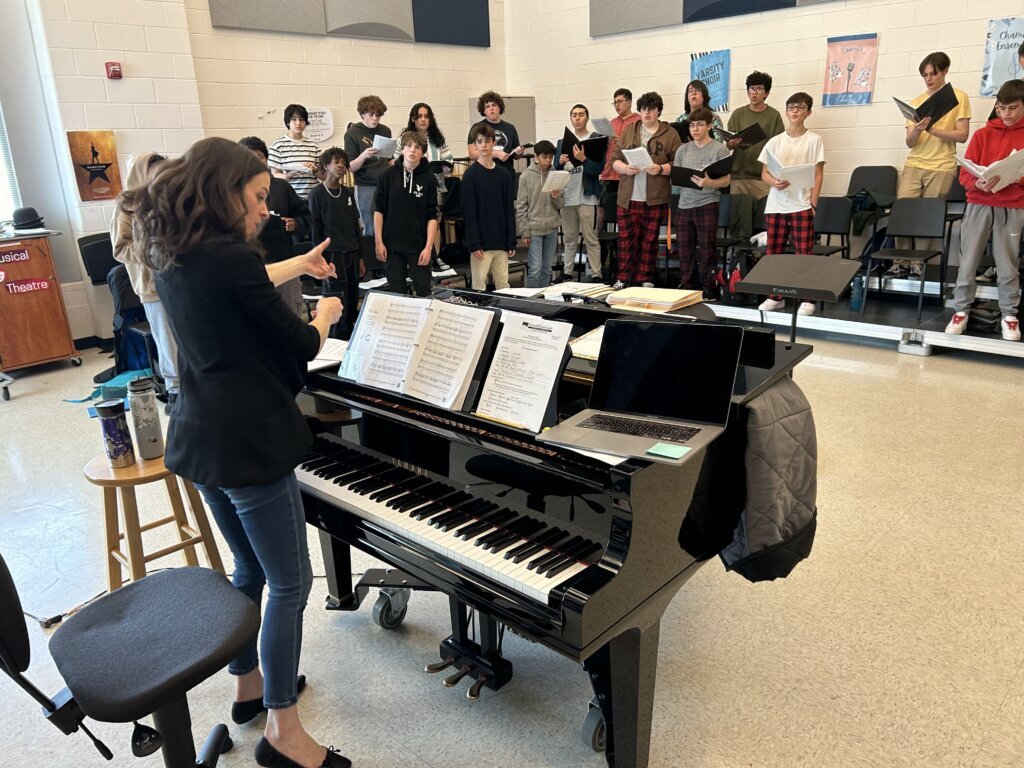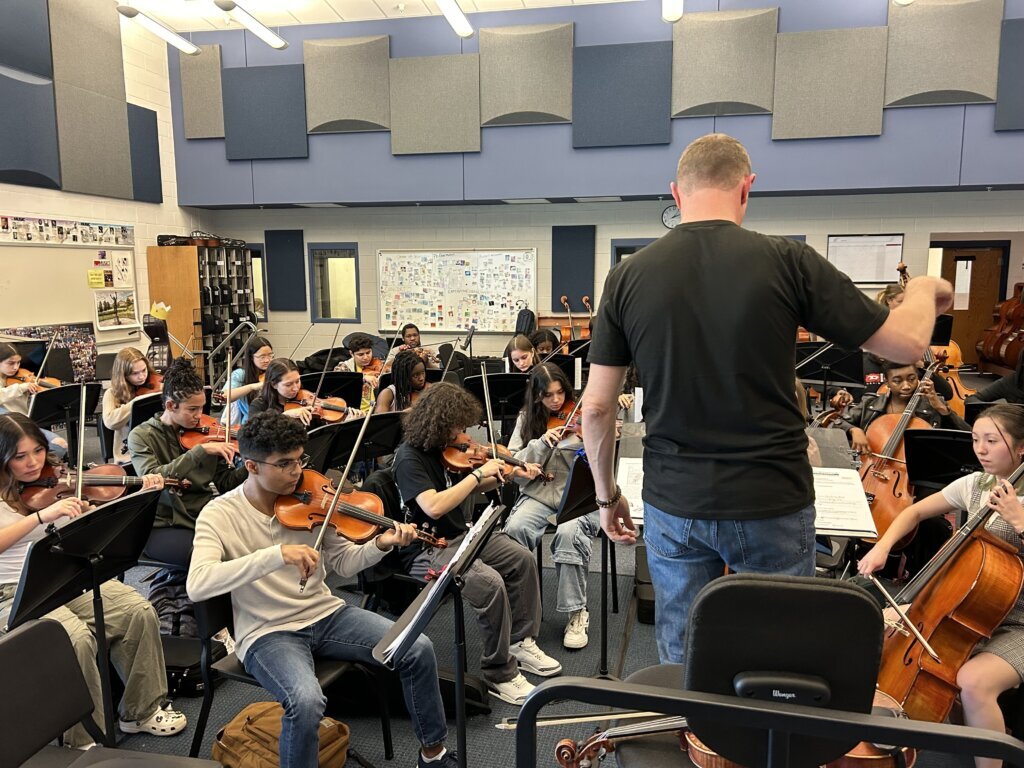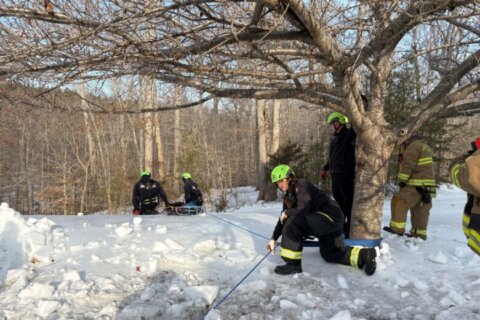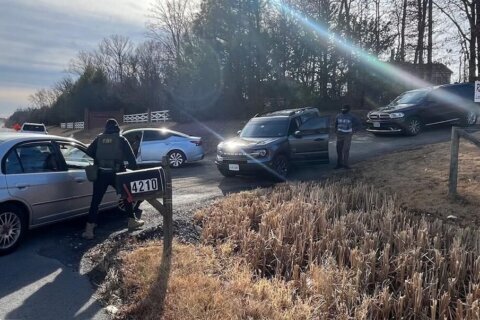This video is no longer available.
Before making the trek to Room 1617 at Colgan High School, sophomore Jordyn Floyd has to sit through French class.
Sometimes, Floyd thinks about the challenges of certain assignments, such as writing 15 sentences in French. When the class concludes, Floyd, already stressed and high-strung, walks to Keri Staley’s choir class.
The vibe immediately shifts. It can be stressful at times, especially late in the spring, when a concert is just weeks away. But, Floyd said, it’s fun stress.
Staley, the Prince William County, Virginia, school’s choir director, strives to create that atmosphere. They regularly talk about more than music, and if Staley senses there’s something unrelated her students want to talk about, she offers them the safe space to talk about it.
At Colgan, hundreds of students are enrolled in choir, orchestra, piano or visual arts. In addition to the students who live nearby, the campus also welcomes students who have to audition to join one of those programs.
Staley and her colleagues strive to create a welcoming and supportive class environment, and their students say the result is a confidence they expect to benefit from after they graduate high school.
They received social media recognition from the U.S. Department of Education for those efforts.
“It’s nice to know that there’s somebody who believes in us, even when we don’t,” said Floyd, who moved to Northern Virginia just to attend the school.
‘Feel like a family’
During one of Staley’s classes Monday afternoon, the group prepared to sing “Fly Me To The Moon.” It was a strategic choice, because of the afternoon’s eclipse, Staley told her students.
Staley played the piano as her students sang. About 90 seconds into the tune, she had them stop and start again. As they continued, she hummed and snapped her fingers.

She offered feedback when they finished.
In her classes, when students don’t know what to do or say, Staley urges them to make an “S” shape with their hands. It stands for “support.”
“They’ve done that for me,” Staley said. “We’ve done that for each other. They know choir is a place where we cultivate supportive, loving thoughts for each other.”
Floyd said that approach both inspires kids to perform well and gives them the freedom to be vulnerable and make mistakes. Sometimes, they talk about learning to sight read or breathing techniques.
But when students take a break and talk about things beyond music, “it makes us feel like a family,” Floyd said.
“I always say, ‘Everybody’s voice cracks. We all make mistakes,'” Staley said. “‘So let’s make sure that this is a loving, supportive place where we can make mistakes and grow together.’ That’s why it’s really important, because it’s who we are.”
Staley tries to put a positive spin on whatever the class is doing, and reminds students to take care of themselves. They have obligations in other courses, she said, but they also jump at the opportunity to volunteer on weekends.
The students value authenticity, Staley said. She creates a supportive atmosphere by being herself. In turn, Floyd said, the students follow her lead.
“I just have to sort of be the listener and be the person that sends it out to the universe of just really positive energy. And knowing that we as parents, as teachers — we can’t fix all the problems. We can listen, we can support, but so much of it is them learning how to grow and figure it out on their own, and that’s hard,” Staley said.
Sense of trust
Just down the hallway from Staley’s choir room, Ben Bernstein spent Monday afternoon leading one of his orchestra classes.
He meets many of his students while they’re in eighth grade. That’s when he hosts an event during which he introduces many of them to each other. It involves breakfast, a scavenger hunt and a tour of the building.
The goal, he said, is to make the transition to high school a bit easier.

Junior Ella Mead didn’t meet Bernstein until a few days before the first day of school, though. Her eighth grade year came during the pandemic, and she auditioned for a spot in the program virtually.
At the back-to-school bash, Mead said Bernstein complimented her work. She writes her own music and sang a few of her original songs.
“He made us all feel welcome, even on the first day,” Mead said. “I never felt out of place in that class. I always felt very accepted.”
That feeling hasn’t waned. The students, Bernstein said, have a shared love of music. By the end of their first year in his class, they develop a sense of trust.
“I always make sure they know that I’m always here for anything,” Bernstein said. “If they ever want to talk about anything, they know they can talk to me. They also know I will be very honest.”
At any given moment, Bernstein said he can be funny, energetic or scary, depending on what’s happening in class. It’s part of his strategy to have his students give it their all. He has high expectations, and because they’re a team, nobody wants to let each other down.
Mead recently auditioned for the All-State Orchestra, but found out she didn’t make it. She talked to Bernstein about her frustration, and he assured her that she isn’t a lesser musician because she didn’t get a coveted spot.
“We all have a lot of emotions, because we’re all the crazy teenagers,” Mead said. “It’s nice to have someone that supports us and gives us something stable throughout all of that craziness.”
There’s no clearer indication of the impact Bernstein has on students than when they come back to visit after graduation, he said.
‘Dream to work here’
Don Magee has been a band director for almost 40 years, and described his experiences at Colgan as a dream come true.
Like Staley and Bernstein, he works to inspire his students by helping create a welcoming atmosphere. It doesn’t take much work, he said.
“The band room is the first place students come when they get to school, it’s the last place they come before they leave,” Magee said, referring to band culture.
The ninth grade band class meets every day, first thing in the morning. They start their day, he said, “with a class that they love, and the teacher that they know loves them.”
The connections happen organically, because of the shared passion for music.
Senior Jenet Bagang started her high school career off in the Zoom version of Magee’s band class because of the pandemic. That made it challenging to develop relationships, but now that classes have been back in person, Bagang said there’s a noticeable difference.
“We’re always just making wonderful music,” Bagang said.
The physical band space is also welcoming, she said.
“At the end of the day, you have somewhere to go,” Bagang said. “And that’s your rest. You’re in your safe spot. In other classes where you’re stressed, I always look forward to going back to the band hall.”
The only thing that keeps him up at night, Magee said, is “wondering whether you’ve done enough for the kids.”
Get breaking news and daily headlines delivered to your email inbox by signing up here.
© 2024 WTOP. All Rights Reserved. This website is not intended for users located within the European Economic Area.








